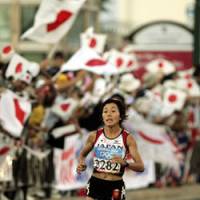Mizuki Noguchi is chasing history.
Her quest to become the first woman to win back-to-back Olympic marathons is now in its final, grueling stages of preparation. And this much is certain: Aug. 17 will be a day she'll never forget, and if she repeats as marathon champion, it'll be a day Japanese people will never forget, too.
On Thursday, Noguchi held a news conference on her 30th birthday in Kobe, informing reporters that she's "moving into high gear for the actual race."
A day later, she departed for a high-altitude training camp in St. Moritz, Switzerland.
Noguchi's stirring victory at the 2004 Athens Games catapulted her into the upper echelon of Japanese sports heroes. By wearing specially designed rice-husk shoes, Noguchi has also attracted a worldwide curiosity other runners usually don't get.
The women's marathon made its Olympic debut in 1984 in the Los Angeles Summer Games. American Joan Benoit captured the gold.
Twenty-four year later, Dr. Jack Daniels, who has served as an adviser to Benoit and legendary male runners Jim Ryun and Alberto Salazar, weighed in on the subject of Noguchi's quest.
"(Ethiopian) Abebe Bikila won the marathon in the 1964 Japan Olympics wearing shoes after having won in the 1960 Rome Olympics running barefoot," Daniels told me.
Daniels' athletic, coaching and professional biography could be the topic of several columns.
For now, here's a brief primer: He competed in the 1956 Melbourne Games, collecting a silver medal in the modern pentathlon. Then, in the years leading up to Rome Olympics, he studied exercise science at the Royal Gymnastics Central Institute in Stockholm and earned a doctoral degree in exercise physiology from the University of Wisconsin.
Daniels took home a second modern pentathlon medal, a bronze, from Rome. So, yeah, he understands an elite-level athlete's psyche and the pressure one feels while competing for a second time in this global extravaganza.
"The streets of Rome were not cool," Daniels said. ". . . When we had our (modern pentathlon) running event, it was 103 degrees (39.4 C). The marathon was at night, however, so it was not that hot.
"Still, the precedent was there and the fact that the best marathoner in the world won under two very different sets of foot-wear conditions should offer some answer to the question about the rice shoes. It isn't the shoes. It's the mind and body of the competitor . . . "
By the way, Daniels has been called the "the world's greatest coach" by Runner's World Magazine.
During a coaching career that dates back to the 1960s (he was the altitude consultant for the U.S. squad at the Mexico City Olympics and spent time as the Peru national team track coach, working with Larry Snyder, Jesse Owens' ex-coach at Ohio State), Daniels' runners have amassed 31 NCAA individual championships, 131 All-American honors and eight NCAA team titles.
Daniels is the head distance running coach at Northern Arizona University's Center for High Altitude Training. In recent years, he's served as the research director of exercise physiology for Nike and continues to write books, including the well-regarded "Daniels' Running Formula" and articles and lecture on running and training.
Thus, it seems fair to suggest that Daniels is one of the best people on the planet to ask this question: Do you think Noguchi has a strong chance to repeat in 2008?
"If her training is going well and she does what is necessary to prepare for the heat and humidity, she could win," Daniels said. "Or it could be a rough day, as it was for Paula (Radcliffe, the exhausted English star who pulled out of the 2004 marathon at the 37-km mark) in Athens, and whose to say she wasn't and isn't the greatest ever?"
In recent years, an increasing number of high-profile athletes have participated in high-altitude training camps, including Kosuke Kitajima, Ian Thorpe, Paula Radcliffe and 2000 Sydney Olympics women's marathon gold medalist Naoko Takahashi.
The belief is that the increased effort it takes to work out in thinner air will help the athletes have stronger lungs when they compete at lower elevations.
Daniels has a differing viewpoint, though he understands why Noguchi is spending time in St. Moritz.
"I personally think altitude training is way overhyped," he said. "The most important thing is that wherever you choose to train needs to be a place that offers everything that makes you happy — good training facilities, medical attention when needed, friendly atmosphere, desirable weather, good place to sleep and rest, good food.
"If you have those things and it is all available at altitude, then that's OK. But if those things are more available at sea level, then that's the place to be. Certainly, if the best athletes in the world chose to do some altitude training, then altitude training gets the credit.
"Someone said a very high percentage of Olympic gold medals in distance running events are won by athletes who live at altitude, but you could say the same thing and exchange the words 'at altitude' with 'close to the equator.' Is it altitude that makes distance runners so great or is it living so close to the equator that leads to such success?"
That's a question that won't lead to a consensus anytime soon.
Anyway, Noguchi doesn't have time to focus on a never-ending debate. Her birthday is now a distant memory and the majestic Swiss Alps are just a temporary setting before she chases history in Beijing.
Clearly there would be no greater drama for Japan's female Olympians this summer than this: Noguchi repeats as champion.

















With your current subscription plan you can comment on stories. However, before writing your first comment, please create a display name in the Profile section of your subscriber account page.